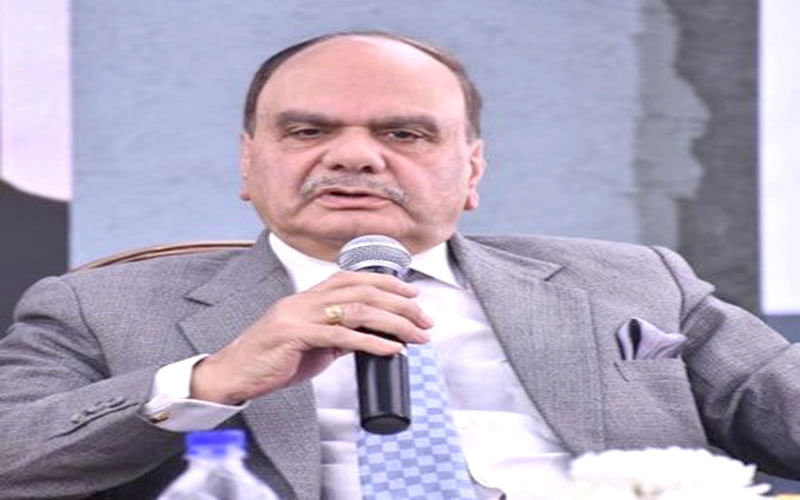Srinagar, March 27: Speaking at a function of International peace forum in Delhi today, Ashok Bhan a noted Supreme Court lawyer and Kashmiri Leader said, “the democracy is the only effective means to usher in peace, stability and societal equanimity/inclusiveness in Kashmir.”
Bhan said that all the segments of Kashmiris have suffered colossal loss of lives of innocents, destruction of properties and exile of the natives. “Enough is enough let Kashmiris live in peace, inclusive societal frame and with the freedoms guaranteed by the constitution,” he said.
He said, although the muscular policy on terrorism and violence is successful in containing terrorism, the crucial task for the government and civil society is to win the hearts and minds of the people by a policy that allows enjoyment of freedoms and human rights enshrined in the Constitution.
In imparting the constitutionalism the fundamental freedoms are liberty, expression and democracy, Bhan said.
“Election being the basic structure of the democracy as such in turbulence effected Jammu and Kashmir, Parliamentary elections assume greater importance for the people as a means for mainstreaming the Kashmir affairs and to make an informed choice between the turbulence and peaceful life in violence free Naya Kashmir,” he said.
Parliamentary elections are important in Jammu and Kashmir, he said.
“The fresh carving of the parliamentary constituencies after gerrymandering by delimitation process has long term political consequences. Till 2019, Jammu and Kashmir state had six constituencies. Two for Jammu region (Jammu and Udhampur constituency), three for Kashmir region (Srinagar, Baramulla and Anantnag) and one for Ladakh,” he said.
After the reorganisation, the five seats have been so distributed that while Jammu region has retained its two seats of Jammu and Udhampur, it has got share in the third seat carved out of Anantnag seat of Kashmir region, he said.
Named as Anantnag-Rajouri seat, this seat is commonly shared between Jammu and Kashmir regions.
While having eleven assembly segments from Kashmir region, it has seven assembly segments from Jammu region. The Assembly segments falling within the district of Poonch and Rajouri which were earlier part of Jammu parliamentary constituency (with the exception of Kalakote-Sundarbani) are now part of this newly carved constituency of Anantnag-Rajouri.
“Lot is being speculated as to what extent this newly carved constituency is going to impact the political trends, political pundits say this constituency is going to act as a bridge between Jammu and Kashmir regions, for others, it is going to change the balance . Whichever way the constituency goes, one thing is sure, it is going to be a very competitive election here with a number of parties seeking to test their political fortune,” he said.
As a matter of fact it is going to be highly important election for all the parties. For the BJP, the aspiration to go beyond its social base of two constituencies in Jammu region and create foot prints in Kashmir region via Anantnag-Rajouri seat, he said.
BJP has build hold in Gujjar-Pahari constituency – initially by granting political reservation to the Gujjars as Scheduled Tribes and later by granting Scheduled Tribe Status to the Paharis.
By winning at least three seats during the parliamentary elections, it seeks to assert its potential in forming the government after assembly election, alone or in alliance with another party to justify the inoperability of article 370 to the whole world, Bhan said.
Certainly with five seats, Jammu and Kashmir’s Lok Sabha share is too small to make any impact on the larger picture – Yet, the small number of seats notwithstanding, elections are considered crucial by the people and political parties for a number of reasons.
The first and foremost reason being that this will be first big electoral exercise to take place in J&K in last few years. After the last elected government was pulled down and Legislative Assembly was dissolved in the middle of 2018, there have not been many opportunities for the political parties to mobilise their supporters and for voters to vote. Even the grass root elections (with the exception of District Development Council elections held in 2020) have been a rarity, he said.
The last Panchayat and Municipal elections took place in 2018.
It is in the situation of ‘no election’ – that the parliamentary elections have assumed importance. For political parties having come to understand that earliest that the assembly elections would take place would be after the parliamentary elections are over – the parliamentary elections have become an opportunity to test the political ground, he said.
More so, for its being the first major electoral exercise after the abrogation of the special constitutional status of Jammu and Kashmir and after the reorganisation of Jammu and Kashmir. The political performance of parties would provide some indication about their standing in the assembly elections later, noted Bhan.
“In electoral democracy ‘Vote’ has the greatest power. Therefore I as an incorrigible Kashmiri beseech my fellow Kashmiris to vote in large numbers in the ensuing Parliamentary election,” said Bhan.
“Let a message go to the whole world, Kashmiris reject terrorists and we the Kashmiris wish to revive the glory of our Kashmir which was known as the land of Divine sages bestowed with divine grace and spirituality flourishing through ages. Kashmir is the cradle of civilisation, science and innovation,” he said.
“AGAR FIRDAUS BAR ROO-E ZAMEEN AST, HAMEEN AST-O HAMEEN AST-O HAMEEN AST,” Bhan concluded.







